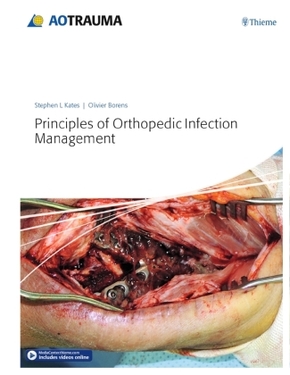Principles of Orthopedic Infection Management
| Verlag | Thieme |
| Auflage | 2016 |
| Seiten | 496 |
| Format | 22,3 x 28,6 x 3,0 cm |
| Hardback (Thread Stitching) | |
| Gewicht | 1894 g |
| Artikeltyp | Englisches Buch |
| ISBN-10 | 3132410756 |
| EAN | 9783132410756 |
| Bestell-Nr | 13241075A |
Principles of Orthopedic Infection Management
The medical world continues to make extraordinary advances in both scientific knowledge and surgical skill, yet despite these achievements, surgeons continue to struggle with the challenge of postoperative infection. Without proper prevention or treatment, orthopedic infection can become just as life-threatening as the initial trauma.
This highly informative clinical go-to text provides the core principles, treatment options, and the latest information and research specifically for the purpose of helping physicians manage orthopedic infections and related issues.
The book's key features include:
- Contributions from 63 world renowned specialists from a broad range of fields in orthopedic traumatology and infectious diseases
- In-depth case examples involving 21 adult and 4 pediatric patients and covering a wide range of infections and anatomy
- Nine algorithms to assist in complex decision making
- Over 800 illustrations and images, and online access to 6 video presentations that outline the important steps in the prevention or management of infected joints, tissue, and implants
AOTrauma is proud to present this comprehensive new publication, which will be valuable to both orthopedic and trauma surgeons, as well as researchers and other medical experts within the field of infectious disease.
Hear the authors discuss Principles of Orthopedic Infection Management.
Inhaltsverzeichnis:
Section 1 Principles
1 Implant-associated biofilm
2 Host immunity
3 Microbiology
4 Prevention of intraoperative infection
5 Systemic antiobiotics
6 Local delivery of antiobiotics and antiseptics
7 Diagnostics
Section 2 Special situations
8 Open fractures
9.1 Infection after fracture
9.2 Infected nonunion
10 Infection after joint arthroplasty
11.1 Septic arthritis
11.2 Septic arthritis after anterior cruciate ligament surgery
12 Spondylodiscitis
13 Soft-tissue infections
14 Open wounds
Section 3 Cases
15.1 Acutely infected tibial nail
15.2 Acutely infected lateral malleolar fracture
15.3 Acutely infected proximal humerus after soft-tissue repair
15.4 Infected tibial delayed union with broken implants
15.5 Acutely infected proximal femoral fracture dynamic hip screw
15.6 Acutely infected proximal femoral fracture proximal femoral nail
16.1 Chronically infected distal tibial fracture
16.2 Chronically in fected proximal tibial fracture
16.3 Chronically infected distal femoral fracture
16.4 Chronically infected hip hemiarthroplasty
16.5 Chronically infected distal radial fracture
17 Acute osteomyelitis of the femur
18 Chronic osteomyelitis of the tibia
19.1 Implant removal infected nonunion of the distal humerus
19.2 Implant removal infected nonunion of the tibia
19.3 Implant removal chronically infected total hip arthroplasty
19.4 Implant removal chronic infection after total knee arthroplasty
19.5 Implant removal infected total knee replacement
19.6 Implant removal infected total shoulder arthroplasty
19.7 Implant removal acutely infected total ankle arthroplasty
19.8 Implant removal chronically infected total elbow arthroplasty
20 Pediatric osteomyelitis
20.1 Osteomyelitis of the distal tibia
20.2 Osteomyelitis of the proximal humerus
20.3 Postoperative osteomyelitis of the tibia
20.4 Osteomyelitis/septic arthritis of the pro ximal femur in a toddler
21 Treatment of infection with limited resources

